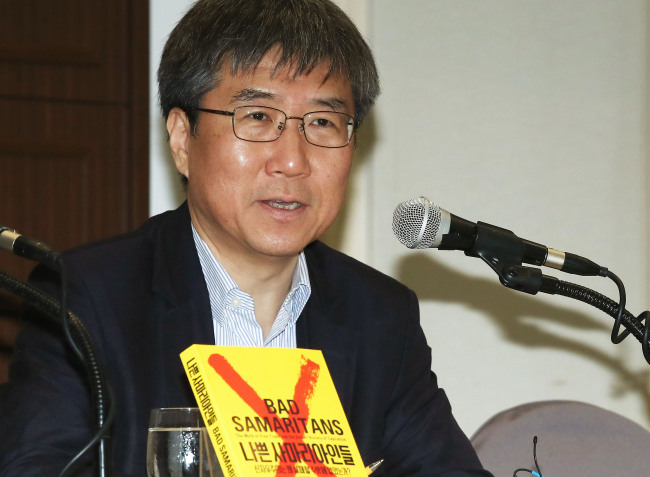US-China friction will have limited impact on global trade regime: Chang Ha-joon
By YonhapPublished : July 17, 2018 - 17:38
The broadening trade war between the United States and China may neither deal a fatal blow to the global trade regime nor save ailing industries in the US, well-known economist Chang Ha-joon predicted Tuesday.
"The trade war (between the US and China) is currently fueling various kinds of tension and fanning a bad mood, but it's not a very big problem in terms of quantity," Chang, currently a reader in the Political Economy of Development at the University of Cambridge, said in a press conference.
"The US has said it will impose tariffs on Chinese exports worth $200.5 billion. It seems to be an enormous amount, but in fact it only accounts for about one hundredth of China's total exports, which stand at $2.27 trillion," the Korean-born economist pointed out.

Given that the US imposes a 10-percent tariff on $200.5 billion-worth of Chinese goods, the total amount of US tariffs on Chinese goods represents only a fraction of the global gross domestic product, at 0.03 percent, Chang said. "So in terms of quantity, it won't have an impact like upsetting the global trade."
Accusing Chinese exports of hurting US industries and eliminating American jobs, the Trump administration released on July 10 plans to impose 10 percent tariffs on $200 billion in Chinese goods, triggering global concerns about a deepening trade war between the two economic powerhouses. The plans are subject to a two-month review process.
Chang underlined that the root cause for Trump's growing protectionism stems from domestic conditions in the US: the country's fragile welfare system and social safety net for the jobless, including the dearth of labor unions, made American workers vulnerable to unfavorable domestic impact from global trade.
"In fact, the US reliance on trade accounts for only 15 percent while the corresponding figure for the Netherlands, for example, reaches 60 percent," he said, adding that the Netherlanders are far less susceptible to job losses as a result of free trade, mainly because of the state's welfare system.
"The US is only blaming China for what the country has itself caused internally because it doesn't want to resolve the issue internally by collecting more taxes from the rich and providing vocational education for the jobless," according to Chang. "The US is unable to survive (the global free trade regime) in this way and the so-called trade war, although it seems very raucous, will have far less impact than expected."
The economist also cited South Korea's weak welfare spending as the reason why the government is facing wild resistance from employers over its policy efforts to hike the legal minimum wage.
On Monday, President Moon Jae-in apologized for dropping his campaign promise to increase the minimum wage to 10,000 won ($8.88) per hour by 2020 in the face of strong opposition from employers.
About 25 percent of South Koreans are self-employed, while the average proportion for advanced economies stands at about 12 percent, a result attributable to the country's low welfare spending of only 10 percent of GDP, he said.
"Without welfare systems to support them, those self-employed people are driven to open their own businesses (after being laid off) and now find themselves unable to afford to pay the minimum wage," he noted.
"In order to solve the problem, I think South Korea needs to adopt a structural reform of its social welfare system."
This month, the local publisher Bookie released a special edition of Chang's 2007 book "Bad Samaritans," marking the 10th year since the book was blacklisted by the defense ministry.
In 2008, the Ministry of National Defense under the then President Lee Myung-bak, put Chang's book and 22 other publications on a list of books forbidden inside the barracks.
"Bad Samaritans," which warns against the then-popular neoliberalism and an unrestrained global free trade regime, was labeled by the ministry as anti-government and anti-American.
"We need to pose a fundamental question about neoliberalism and globalism in order to understand how the neoliberal policy line we have followed over the past 20 years has made our lives difficult," Chang said. "The publication of this special edition was designed to offer an opportunity to pose the question." (Yonhap)


![[Exclusive] Korean military set to ban iPhones over 'security' concerns](http://res.heraldm.com/phpwas/restmb_idxmake.php?idx=644&simg=/content/image/2024/04/23/20240423050599_0.jpg&u=20240423183955)

![[Graphic News] 77% of young Koreans still financially dependent](http://res.heraldm.com/phpwas/restmb_idxmake.php?idx=644&simg=/content/image/2024/04/22/20240422050762_0.gif&u=)



![[Pressure points] Leggings in public: Fashion statement or social faux pas?](http://res.heraldm.com/phpwas/restmb_idxmake.php?idx=644&simg=/content/image/2024/04/23/20240423050669_0.jpg&u=)










